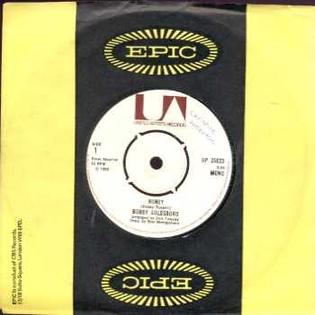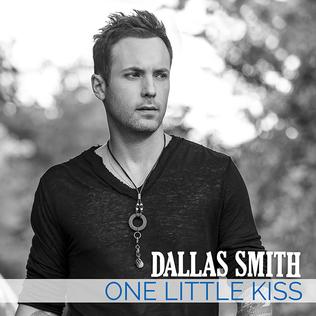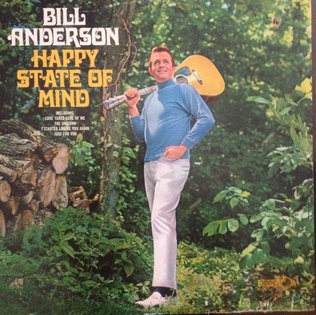Related Research Articles

"Ain't Nothing Like the Real Thing" is a 1968 single released by American R&B/soul duo Marvin Gaye and Tammi Terrell, on the Tamla label in 1968. The B-side of the single is "Little Ole Boy, Little Ole Girl" from the duo's United LP. The first release off the duo's second album: You're All I Need, the song - written and produced by regular Gaye/Terrell collaborators Ashford & Simpson - became a hit within weeks of release eventually peaking at number 8 on the Billboard Hot 100 and number 1 on the Hot Soul Singles chart, the first of the duo's s two number 1 R&B hits. In the UK "Ain't Nothing Like the Real Thing" reached number 34.

"Honey", also known as "Honey ", is a song written by Bobby Russell. He first produced it with former Kingston Trio member Bob Shane. Then he gave it to American singer Bobby Goldsboro, who recorded it for his 1968 album of the same name, originally titled Pledge of Love. The song's narrator mourns his deceased wife, beginning with him looking at a tree in their garden, remembering how "it was just a twig" on the day she planted it.

"Once a Day" is a song written by Bill Anderson and recorded as the debut single by American country artist Connie Smith. It was produced by Bob Ferguson for her self-titled debut album. The song was released in August 1964, topping the Billboard country music chart for eight weeks between late 1964 and early 1965. It was the first debut single by a female artist to reach number one on the Billboard Hot Country Songs. This song peaked at number one for the week of November 28, 1964, and it stayed at number one for eight consecutive weeks, a record for a female solo artist for nearly 50 years, until it was surpassed by Taylor Swift's "We Are Never Ever Getting Back Together" in December 2012.
"By the Time I Get to Phoenix" is a song written by Jimmy Webb. Originally recorded by Johnny Rivers in 1965, it was covered by American country music singer Glen Campbell on his album of the same name. Released on Capitol Records in 1967, Campbell's version topped RPM's Canada Country Tracks, reached number two on Billboard's Hot Country Singles chart, and won two awards at the 10th Annual Grammys. Broadcast Music, Inc. (BMI) named it the third most performed song from 1940 to 1990. The song was ranked number 20 on BMI's Top 100 Songs of the Century. Frank Sinatra called it "the greatest torch song ever written."
"Life Turned Her That Way" is a song written by Harlan Howard and first recorded by American country music artist Little Jimmy Dickens in 1965. Mel Tillis recorded it in 1967 and released it as a single in February and was his seventh chart entry. Ricky Van Shelton would also later record it and release it as a single. It was the fourth single released from his debut album, Wild-Eyed Dream. Released in late 1987, It was his second number 1 hit on the Billboard Hot Country Singles & Tracks chart in early 1988.
"Drinking Champagne" is a song written by Bill Mack. He released the first version of the song on Pike Records in the mid-sixties. The song grabbed nationwide attention when the version by Cal Smith reached #35 on the country music charts in 1968.
"Little Green Apples" is a song written by Bobby Russell. Originally written for and released by American recording artist Roger Miller in 1968, it was also released as a single by American recording artists Patti Page and O. C. Smith in separate occasions that same year. Miller's version became a Top 40 hit on the Billboard Hot 100 chart and on the UK Singles Chart, while Page's version became her last Hot 100 entry and Smith's version became a No. 2 hit on the Billboard Hot 100 chart. The song earned Russell two Grammy Awards for Song of the Year and Best Country Song. In 2013, "Little Green Apples" was covered by English recording artist Robbie Williams featuring American recording artist Kelly Clarkson, which became a top 40 hit in Mexico.

That's the Way Love Goes is the twenty third studio album by American country music artist, Connie Smith. The album was released in March 1974 on Columbia Records and was produced by Ray Baker. It was Smith's third studio album released on the Columbia label after departing from RCA Victor in 1973 and spawned two singles.

I Got a Lot of Hurtin' Done Today/I've Got My Baby On My Mind is the twenty fifth studio album by American country music artist, Connie Smith. The album was released in January 1975 on Columbia Records and was produced by Ray Baker. The album spawned three singles between 1974 and 1975, which included two Top 20 hits.

The Song We Fell in Love To is the twenty eighth studio album by American country music artist, Connie Smith. The album was released in March 1976 on Columbia Records and was produced by Ray Baker. It was the first of two albums released in 1976 and contained Smith's Top 10 hit, "(Till) I Kissed You."
"Hey Little One", a song written by Dorsey Burnette and Barry De Vorzon, was initially recorded by Dorsey, released on May 2, 1960 on the Era label as the double A-side "Hey Little One"/"Big Rock Candy Mountain". "Hey Little One" reached number 48 on the Billboard Hot 100 chart. Musicians on the recording include veteran session drummer Earl Palmer.
"Baby's Back Again" is a single by American country music artist Connie Smith. Released in December 1967, the song reached #7 on the Billboard Hot Country Singles chart. The single was later released on Smith's 1968 album entitled I Love Charley Brown. The song became Smith's first single to chart on the Canadian RPM Country Tracks chart, reaching #7 as well.
"Cry, Cry, Cry" is a single by American country music artist Connie Smith. Released in September 1968, the song reached #20 on the Billboard Hot Country Singles chart. The single was later released on Smith's 1968 album entitled Connie in the Country. The song became Smith's first single to peak outside the top ten.

"Wastin' Gas" is a song recorded by Canadian country rock artist Dallas Smith for his second studio album, Lifted (2014). It was released October 28, 2014 through 604 Records and Big Loud Mountain Records as the lead single from the album, and fourth overall after the three released in support of Tippin' Point (2014). The song entered the Canadian Hot 100 at number 41 in November 2014, Smith's second highest peak. On the chart issued January 22, 2015, "Wastin' Gas" rose to No. 1 on the Canada Country airplay chart, becoming Smith's first chart topper.

"So Sad " is a song written by Don Everly, which was released by The Everly Brothers in 1960. The song was later a country hit for multiple artists in the 1970s and 80s.

"One Little Kiss" is a country song written by Ashley Gorley, Jimmy Robbins, and Shane McAnally. It was originally recorded by American country singer Jake Owen for his 2013 studio album, Days of Gold, under the title "One Little Kiss ". The song was covered by Canadian country rock artist Dallas Smith three years later with the abbreviated title of "One Little Kiss". Both recordings were produced by Joey Moi. Smith's version was released April 22, 2016 through 604 Records as the second single off his third studio album, Side Effects (2016).
"Burning Bridges" is a song written by Walter Scott and performed by Jack Scott. It reached No. 3 on the Billboard Hot 100, No. 5 on the U.S. R&B chart, and No. 32 on the UK Singles Chart in 1960. It was featured on his 1960 album What in the World's Come Over You.

Wild Weekend is a studio album by American country singer-songwriter Bill Anderson. It was released in May 1968 on Decca Records and was produced by Owen Bradley. The record was Anderson's ninth studio release to be issued during his recording career. It reached peak positions on the Billboard country albums chart and also produced two singles that became major hits.

Happy State of Mind is a studio album by American country singer-songwriter Bill Anderson. It was released in September 1968 on Decca Records and was produced by Owen Bradley. Anderson's tenth studio recording, it was also his second studio album released in 1968. Among the songs included on the release was the title track, which became a major hit in both the United States and Canada.

Big Girls Don't Cry is a studio album by American country music artist Lynn Anderson. It was released in July 1968 via Chart Records and was produced by Slim Williamson. The record was Anderson's third studio recording issued during her career and contained a total of 12 tracks. The title track was spawned as a single from the project and became a major hit on the country charts. The album itself would also reach peak positions on music publication charts.
References
- ↑ Whitburn, Joel (2004). The Billboard Book Of Top 40 Country Hits: 1944-2006, Second edition. Record Research. pp. 387–88.